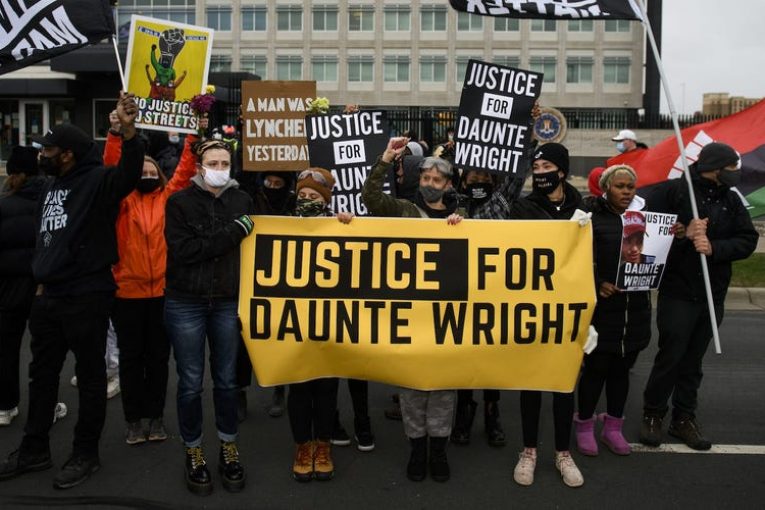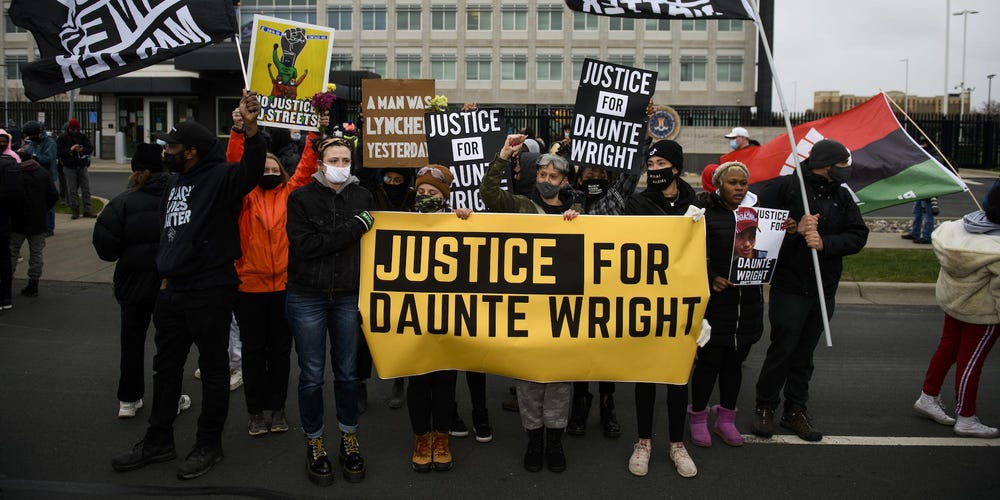

By David M. Greenwald
Executive Editor
It is hard to not feel bad for Kimberly Potter, after all she did not intend to shoot Daunte Wright. It was a horribly tragic mistake.
That’s not to excuse her mistake. A trained police officer should not be mistaking a taser for a gun. A trained police officer is responsible for her mistakes. So yes, the jury in my view, got this one right for a change.
There is question whether Potter should have even used the less lethal taser she was intending.
“The use of deadly force was not appropriate and the evidence suggests a reasonable officer in Officer Potter’s position could not have believed it was proportional to the threat at the time,” said Seth Stoughton, a professor at the University of South Carolina School of Law.
I’m not convinced that Potter needs to go to prison for her negligence but at the same time, having viewed this scenario over and over again, I wonder, would an officer have attempted to use a taser against a white person who behaved similarly? I suspect your answer to that will underlie your entire view of police encounters that end in tragedy.
Despite the fact that in recent months, we have seen convictions in both the death of George Floyd and now Daunte Wright, those remain rare.
The NY Times in an article on Friday found, “despite the two high-profile convictions  in Minneapolis, a review of the data a year and a half after America’s summer of protest shows that accountability for officers who kill remains elusive and that the sheer numbers of people killed in encounters with police have remained steady at an alarming level.”
in Minneapolis, a review of the data a year and a half after America’s summer of protest shows that accountability for officers who kill remains elusive and that the sheer numbers of people killed in encounters with police have remained steady at an alarming level.”
And while the murder of George Floyd in Minnesota touched off national demonstrations and at least a temporary reassessment of policing, the Times found, “very little has changed” in terms of the core issues of police violence and accountability.
The Times reports, “Since Mr. Floyd’s death in May of last year, 1,646 people have been killed by the police, or about three people per day on average, according to Mapping Police Violence, a nonprofit that tracks people killed by the police. Although murder or manslaughter charges against officers have increased this year, criminal charges, much less convictions, remain exceptionally rare.”
That’s not to say there hasn’t been some progress.
Chris Uggen, a sociology and law professor at the University of Minnesota, told the Times that high profile convictions still send a message to the police.
“The probability of punishment is not zero,” he said. “So it moves the needle to some degree, and it can certainly affect the behaviors of police officers.”
But accountability is still difficult.
The NY Times yesterday had a front page story: “How Paid Experts Help Exonerate Police After Deaths in Custody.”
The Times tracked “a small but influential cadre of scientists, lawyers, physicians and other police experts whose research and testimony is almost always used to absolve officers of blame for deaths, according to a review of hundreds of research papers and more than 25,000 pages of court documents, as well as interviews with nearly three dozen people with knowledge of the deaths or the research.”
“The experts also intersect with law-enforcement-friendly companies that train police officers, write police policies and lend authority to studies rebutting concerns about police use of force,” the Times writes. “Together they form what often amounts to a cottage industry of exoneration.”
But not just that. Yesterday the San Jose Mercury News Editorial argued, “The time for coddling California’s police is over.”
At issue, the city of Richmond finally turned over data on police dog bites.
In Richmond, “it turns out, police dogs bite more frequently than in New York City, which has 80 times the population, Chicago or Washington, D.C.”
Overall: “From 2014-19, there were 73 Richmond cases in which police dogs caused significant injury, an average of more than one a month. More than 80% of people bitten by dogs in Richmond were either hiding or running from police; more than 60% were found unarmed. When race was noted in police reports, more than half of those bitten were Black, although they make up only 20% of Richmond’s population.”
However, “As in too many police-records cases across the state, the Richmond dog-bite incidents only came to light after litigation forced the city to turn over documents. This news organization and its media partners had to go to court to shake free the records.”
But the biggest problem is that the moment after George Floyd was fleeting.
Look no further than San Francisco Mayor London Breed and her announcement of stepped up policing in the Tenderloin. Her action was backed on an 8-2 vote by the Board of Supervisors last Thursday including by a number of notable progressives.
San Francisco Chronicle columnist Justin Phillips noted that while the right “claimed that the moment marked an ideological shift by a major “defund” politician,” the reality is that “Breed’s comments weren’t some kind of course correction. Instead, they were a return to form for the reform-light, police-friendly mayor, and a sign that she is leading the city back down a familiar — and potentially flawed — path.”
Phillips noted that this goes back to her 2012 Election to the Board of Supervisors where “she supported expanding foot patrols in the city. The San Francisco Police Officers Association returned the love by endorsing her candidacy.”
Moreover, in 2014, Phillips notes, in response to the killing of Michael Board, Breed “helped vote down a Board of Supervisors resolution of support for the movement, saying at the time that the city was “not Ferguson.””
She was silent on issues from Mario Woods 2015 shooting to the text message scandal.
It was only last year, that the idea that Breed was somehow a “defund” mayor, “when she introduced a plan to redistribute $120 million in law enforcement spending over two years to Black neighborhoods. It was a rare moment in her political career where she spoke about cops in a way that resonated more with reformers and police abolitionists than with the police unions.”
Phillips argues, “it didn’t take long for Breed to revert to form.”
He concludes: “Gun-toting foot patrols can’t address the root of the Tenderloin’s problems. But they can appease a base of voters who equate police presence with safety. And they can remind us who London Breed has always been.”
In fairness to Breed, she’s not alone here. Last year marked a brief moment for reform which has now apparently passed us by.


You may choose to focus on some things that may not have changed much but that isn’t the case, a lot has changed since George Floyd.
The pic shows several “Justice for Daunte Wright” signs.
I wonder if asked if any one of sign carriers know anything about Daunte Wright’s criminal history?
You seem fixated on this point. Are you aware of the criminal history of Miranda or Gideon? In the end, does it matter? We live in a constitutional democracy, where even bad people or people who have long histories of doing bad things have rights.
It’s not like Daunte Wright was some innocent victim even though activists try to portray him that way so they can push their agenda.
Why is that so important to you? He certainly didn’t deserve to die.
Can’t you see? Some folk like to be ‘contrarian’ when another posits an opinionated (as opposed to purely factual) account. Duh!
David, you and Keith O seems to thrive on the “point/counter-point” model… they often had a segment on TV devoted to that model, posing as ‘thoughtful discussion’, as it builds ‘readership’, and ‘ratings’… and egos…
Enjoy your mutual holiday gifts, that keep on giving, year-round… if you look at past threads, they usually start out with an article by David, usually expressing opinionated views, a Keith O response, then 4-8 ‘parryings’ between the two of you… appears to be a pattern that gives you both ‘pleasure’…
Enjoy, but you might both should “just get a room” …
Today, this thread, is ‘classic’…
And don’t leave out that often our comments are followed by your boorish replies…
Wrong word… more accurately, ‘cynical’, ‘snide’, or “inconveniently on point”…
Back to topic… things have changed in policing, and views of it… but it can be slow, even glacially slow (to some)… but glaciers have changed the landscape, big time… for what many see, the better…
In the trigger event discussed, David is right, Mr Wright did not “deserve to die”, even if he had some “f-ups”… the officer charged does not deserve serious jail/prison time, but she does deserve to be excluded from carrying a weapon “in the line of duty” (like, forever), and some fairly serious counselling… to help us deal with her in the future, and especially, for her, to fully realize and accept what she did, and heal from that realization.
The fact is, a man is dead, and “didn’t deserve killing”… there is also his family…
Is the Davis Vanguard somehow a “defund” blog?
True. Neither can pouring money into social programs.
True. Even in liberal San Francisco. Imagine what the more conservative other 95% of the country think.